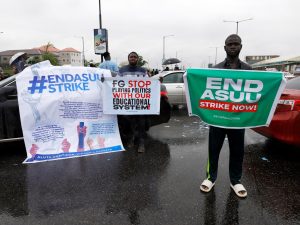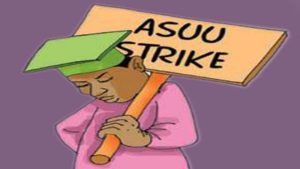ASUU Issues 14-Day Ultimatum to FG, Threatens Fresh Strike Over Lingering Demands

Nigeria’s public universities may soon be plunged into another shutdown as the Academic Staff Union of Universities (ASUU) has issued a 14-day ultimatum to the Federal Government to meet its longstanding demands or face a fresh round of industrial action.

In a statement titled “Notice of Strike Action”, ASUU President, Prof. Christopher Piwuna, said lecturers are growing increasingly frustrated over the government’s reluctance to honour agreements and tackle what the union describes as the “declining fortunes of university education.”
At the heart of ASUU’s grievances are issues that have haunted the education sector for over 16 years: renegotiation of the 2009 ASUU-FGN Agreement, revitalisation and sustainable funding of universities, unresolved arrears of 25–35% salary increases, delayed promotions spanning four years, non-remittance of third-party deductions and alleged victimisation of lecturers at institutions including Lagos State University, Kogi State University and the Federal University of Technology, Owerri.
The union’s National Executive Council (NEC) met at the University of Abuja on September 28, where members resolved that patience has run thin. If government inaction persists beyond the two-week ultimatum, ASUU said it will first embark on a two-week warning strike before escalating to a total, indefinite shutdown of campuses nationwide.
This standoff comes amid broader political debates about Nigeria’s development priorities. Successive governments have promised reforms in the education sector, yet ASUU argues that universities remain neglected while funding for infrastructure and other political projects continues. The union insists that Nigeria has the financial capacity to fix its higher education system if leaders are willing to make it a national priority.
But beyond the political wrangling, the human impact looms large. Families are bracing for yet another disruption to their children’s education, with parents fearing wasted academic calendars and additional financial strain. “Each strike feels like we’re starting over,” said Mrs. Felicia Adeyemi, a parent of two undergraduates at the University of Lagos. “Our children lose motivation, and families bear the hidden costs of keeping them idle at home.”
Students too, are caught in the crossfire. Many have experienced repeated delays that stretch four-year courses into six or seven years; unnecessary expenditure; psychological imbalance; loss of proper academic calendar, etc. “It’s not just about lectures stopping; it’s about our future being put on hold,” lamented Ibrahim Musa, a final-year student in Kano. Conversely, the repercussion of the ASUU strike affects students in five major ways:

Extra years to graduate: It is usually difficult for undergraduates at the Nigerian public universities under ASUU to graduate within the four, five or six years they’re originally supposed to spend for their courses due to the disruptions in academic activities, leading to constant review of the academic calendars. Sometimes, a student studying for a four-year degree programme spends up to five or more years to graduate.
Impact on mental health: Many students have complained that while universities are on strike, they mostly remain bored and idle at home, while waiting for when schools will reopen. Such boredom and idleness can sometimes lead to mental health challenges which include depression and anxiety, thus taking tolls on the students’ mental health.
Diminishing interest in educational system: With the many ways the constant strikes delay and frustrate students, some students have resorted to looking for opportunities to earn stipends. This situation makes education less interesting and sets them in a tight corner when classes resume from the industrial action.
Waste of accommodation rent: Another serious effect of the strike is that many students who stay off-campus end up burning their rent since they can’t stay in the rented apartments during the shutdown.
Hastiness to cover academic calendar: Usually when the strike is called off, the management of various universities “rush” students to quickly cover the remaining academic workload to end the semester. This has therefore, in many ways affected the students’ chances of learning well and without the stress of having to quickly prepare for C.A. tests, exam, etc.

The business community also watches with unease. Frequent strikes disrupt research partnerships, innovation projects, and industries that depend on university collaborations, particularly in technology and agriculture. For small businesses around campuses such as bookstores, transport operators, food vendors, etc., every shutdown translates into months of lost income.
ASUU has called on traditional rulers, religious leaders, civil society groups, parents and students to pressure government into urgent action, likening the ultimatum to “an alarm of danger” that should not be ignored.
Prof. Piwuna said that “The government has the muscle to avert this looming strike, a stitch in time saves nine”.

As the countdown begins, Nigerians wait anxiously with torn emotions between sympathy for lecturers’ demands and fear of another crippling disruption. The next two weeks could determine whether classrooms remain open or whether yet another chapter of uncertainty unfolds in the nation’s public university system.









